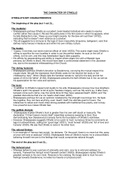Other
'Othello' character profiles
- Course
- Institution
- Book
29 PAGES OF A* GRADE 'OTHELLO' CHARACTER PROFILES - AQA ENGLISH LITERATURE B ASPECTS OF TRAGEDY - This document includes 5 character profiles for the main characters in 'Othello' (Othello, Iago, Desdemona, Emilia and Cassio.) These character profiles are everything I learned about these 5 charac...
[Show more]




